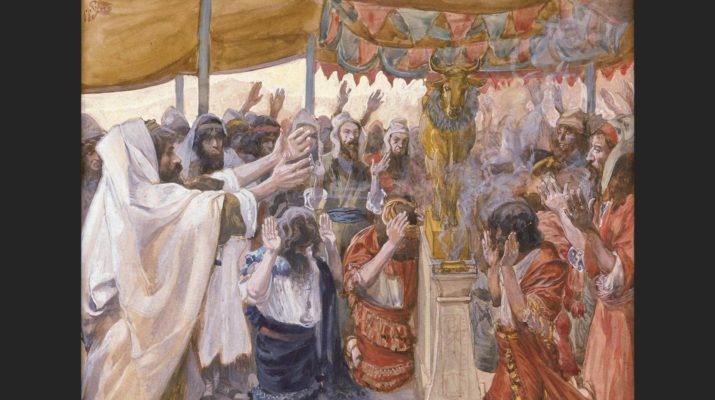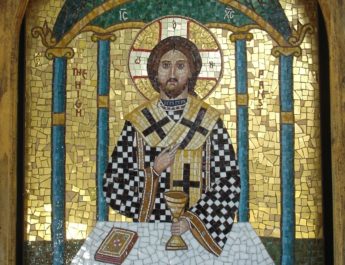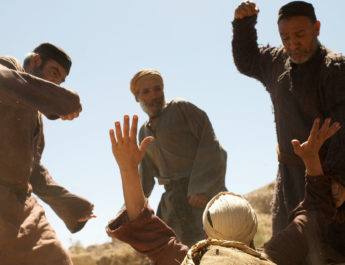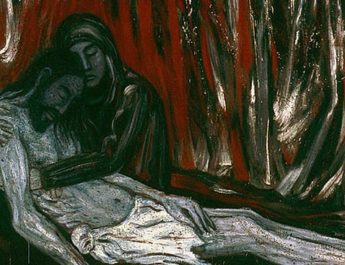Exodus 32:7-14
Ordinary C42
7 The LordA saidB to Moses,C “Go downD at once!
A “Lord” = YHVH. From havah (to be, become) or hayah (to come to pass, become, be). This is the name of the God of Israel, the self-existent and eternal one, the tetragrammaton. This pronunciation has been lost to time so “Lord” is generally used in its place.
B “said” = dabar. This is generally to speak, answer, declare, or command. It might mean to arrange and so to speak in a figurative sense as arranging words.
C “Moses” = Mosheh. From mashah (to pull out in a literal or figurative sense, to draw out) OR from Egyptian mes or mesu (child, son i.e. child of…). This is Moses – the one drawn out from the water, which is to say, rescued. If derived from the Egyptian, his name would share a root with Rameses and Thutmose.
D “go down” = halak + yarad. Halak is go, come, walk. It is walk literally and figuratively and includes people and animals. It can be used figuratively for one’s moral life – how we walk according to God’s way or against it. It can also refer to the walk of life as in the course one’s life takes, the choices we make, etc. Yarad is to go down, descend; going down in a literal or figurative sense. It can be going to the shore or a boundary, bringing down an enemy.
Your people,E whom you brought upF out of the landG of Egypt,H have acted perversely;I
E “people” = am. From amam (to darken, hide, associate; creating shadows by huddling together). This is people or nation. It can be used specifically for a tribe, collectively of troops or armies, or figuratively to refer to a flock of animals.
F “brought up” = alah. This is to go up, approach, ascend, be high, be a priority; to arise in a literal or figurative sense.
G “land” = erets. Root may mean to be firm. This is earth, ground, field land, or country.
H “Egypt” = Mitsrayim. Perhaps from matsor (besieged or fortified place, bulwark, entrenchment; something hemmed in; a siege or distress or fastness); from tsur (to confine, besiege, to cramp). This is Egypt.
I “acted perversely” = shachath. This is to go to ruin, perish, decay, batter, cast off, lose, one who destroys. This can be used in a literal or figurative sense.
8 they have been quickJ to turn asideK from the wayL that I commandedM them; they have castN for themselves
J “quick” = maher. 18x in OT. From mahar (being liquid, which implies flowing; so, hurrying forward, whether in a positive or negative sense). This is speedy, quickly, soon, suddenly, or at once.
K “turn aside” = sur. This is to turn aside in a literal or figurative sense – to depart, decline, rebel, remove, or withdraw.
L “way” = derek. From darak (to tread, march, to walk. Can also mean affixing a string to a box since one needs to step on it to bend it in the process; so also an archer). This is a road as a thing that is walked on. Can be used figuratively for the path that one’s life takes or how one chooses to live one’s life.
M “commanded” = tsavah. This is to charge, command, order, appoint, or enjoin. This is the root that the Hebrew word for “commandment” comes from (mitsvah).
N “cast” = asah. This is to make, do, act, appoint, become in many senses.
an imageO of a calfP and have worshipedQ it and sacrificedR to it and said, ‘These are your gods,S O Israel,T who brought you up out of the land of Egypt!’”
O “image” = massekah. From nasak (to cover, pour out, offer; by analogy anointing a king). This is a pouring out or over. So it could be pouring molten metal to cast an image, making a libation (pouring out a drink offering), or otherwise covering.
P “calf” = egel. May be from the same as agol (round, circular – root meaning revolve). This is a male calf as one that frisks about. Often used for one that is almost grown up.
Q “worshiped” = shachah. This is to bow down, make a humble entreaty, to do homage to royalty or to God.
R “sacrificed” = zabach. This is slaughtering an animal, generally for the purpose of sacrifice. It can mean kill or offer.
S “gods” = elohim. From eloah (God, a god); from el (God, a god). This is most commonly used as a name for God. Technically, it’s in the plural, i.e. gods. It can also mean great, mighty, judge, or ruler.
T “Israel” = Yisrael. Related to “gods” in v8. From sarah (to persist, exert oneself, contend, persevere, wrestle, prevail) + el (see note S above). This is Israel, meaning God strives or one who strives with God; new name for Jacob and for his offspring. This refers to the people and to the land.
9 The Lord said to Moses, “I have seenU this people,V howW stiff-neckedX they are.
U “seen” = raah. This is to see in a literal or figurative sense so stare, advise, think, view.
V {untranslated} = hinneh. From hen (lo! Behold! If, though; an expression of surprise). This is to draw attention, show suddenness or surprise, or to emphasize the importance of the coming statement. See! Lo! Behold!
W {untranslated} = am. Same as “people” in v7. See note E above.
X “stiff-necked” = qasheh + oreph. Qasheh is from qashah (to be fierce, cruel, dense, tough, severe). This is hard, severe, heavy, obstinate, hard-hearted. Oreph is the back of the neck – also used for stiff-necked. It is also used for the back more generally in a literal or figurative sense.
10 Now let me aloneY so that my wrathZ may burn hotAA against them and I may consumeBB them,
Y “let…alone” = yanach. Perhaps from the same as nuach (to rest, calm, camp, free, place, remain, satisfy, settle, station, or wait; implies settling down in a literal or figurative sense). This is to lay down, let alone, pacify, cast down, or deposit. It can also mean to allow something or someone to stay.
Z “wrath” = aph. From anaph (to be angry; properly, breathing hard as a signifier of being enraged). This properly refers to the nose or nostril and by extension the face. It can specifically refer to anger or wrath as one breathes hard and nostrils flare in times of great anger.
AA “burn hot” = charah. Perhaps related to charar (to be hot, burn, glow, melt, be scorched; figuratively, to incite passion, be angry). This is to be displeased, burn with anger, glow, become warn. Figuratively it is a blaze of anger, zeal, or jealousy.
BB “consume” = kalah. This is to end, be finished, complete, prepare, consume, spent, or completely destroyed.
and of you I will makeCC a greatDD nation.”EE
CC “make” = asah. Same as “cast” in v8. See note N above.
DD “great” = gadol. From gadal (to grow up, become great, become wealthy – to advance. The root meaning may be to twist in the sense of the process of growing). This is great, high, bigger, noble, old, marvelous. It can also refer to someone who is powerful or distinguished.
EE “nation” = goy. From the same root as gevah (the back, person, or body); related to gev (among); related to gaah (to rise up). This is nation or people. Often used to refer to Gentiles or foreign nations. It can also be used figuratively for a group of animals. This is where the Yiddish “goy” comes from.
11 But Moses imploredFF theGG Lord his GodHH
FF “implored” = chalah. Properly, this is to be worn; hence, being weak, sick, or afflicted. It can also mean to grieve or, positively, to flatter or entreat.
GG {untranslated} = paneh. From panah (to turn, face, appear). This is face in a literal or figurative sense. It could be face, presence, anger, respect. It can also be used of God to indicate divine favor or presence.
HH “God” = Elohim. Same as “gods” in v8. See note S above.
and said, “O Lord, why does your wrath burn hot against your people, whom you broughtII out of the land of Egypt with great powerJJ and with a mightyKK hand?LL
II “brought” = yatsa. This is to go or come out, bring forth, appear. It is to go out in a literal or figurative sense.
JJ “power” = koach. Root may mean to be firm. This is power, strength, force. It can be literal or figurative, positive or negative. It can also mean capacity or means – what something produces. Additionally, it could refer to some kind of small reptile.
KK “mighty” = chazaq. From chazaq (to strengthen, seize, be courageous, repair, bind, heal, conquer, harden). This is strong, hard, powerful, loud, bold, violent, impudent. It is usually strong in a negative sense.
LL “hand” = yad. This is hand, ability, power. Hand in a literal sense, but also what one can do or the means by which one does it.
12 Why should the EgyptiansMM say, ‘It was with evil intentNN that he brought them out to killOO them in the mountainsPP and to consume them from the faceQQ of the earth’?RR
MM “Egyptians” = Mitsri. Related to “Egypt” in v7. From the same as mitsrayim (see note H above). This is Egyptian.
NN “evil intent” = ra’. From ra’a’ (to be evil, bad, afflict; properly, to spoil – to destroy by breaking into pieces; figuratively, to cause something to be worthless; this is bad in a physical, social, or moral sense; that which displeases, to do harm or mischief, to punish or vex). This is bad, disagreeable, that which causes pain, misery, something having little or no value, something that is ethically bad, wicked, injury, calamity. This refers to anything that is not what it ought to be – a natural disaster, a disfigurement, an injury, a sin.
OO “kill” = harag. This is to strike with deadly intent so it can be kill, destroy, murder, or put to death.
PP “mountains” = har. From harar (hill or mountain). This is mountain, hill, hilly region.
QQ “face” = paneh. Same as {untranslated} in v11. See note GG above.
RR “earth” = adamah. From the same as adam (man, humankind); perhaps from ‘adom (to be red). This is ground, earth, soil as red, or land.
TurnSS from your fierceTT wrath; change your mindUU and do not bring disasterVV on your people.
SS “turn” = shub. To turn back, return, turn away – literally or figuratively. Doesn’t necessarily imply going back to where you started from. This is also the root verb for the Hebrew word for repentance “teshubah.”
TT “fierce” = charon. Related to “burn hot” in v10. From charah (see note AA above). This is burning anger, fierceness, or wrathfulness.
UU “change…mind” = nacham. Properly, this is a strong breath or a sigh. This can be to be sorry, to pity, console. Comfort, or repent. But, one can also comfort oneself with less righteous thoughts, so this can also mean to avenge oneself.
VV “disaster” = ra’. Same as “evil intent” in v12. See note NN above.
13 RememberWW Abraham,XX Isaac,YY and Israel, your servants,ZZ how you sworeAAA to them by your own self,
WW “remember” = zakar. This is to remember, to mark something so that it can be recalled, to be mindful of, to mention.
XX “Abraham” = Abraham. From the same as Abiram (exalted father, a high father – lofty) {from ab (father literal or figurative) + rum (rise, bring up, being high, extol, exalt, haughty; to raise in a literal or figurative sense)}. This is Abraham, father of many nations or father of a multitude.
YY “Isaac” = Yitschaq. From tsachaq (to laugh, mock, play, make sport; this is laughing out loud whether in joy or in a scornful way). This is Isaac, meaning “he laughs.”
ZZ “servants” = ebed. From abad (to work, serve, compel; any kind of work; used causatively, can mean to enslave or keep in bondage). This is a servant, slave, or bondservant.
AAA “swore” = sheba. From sheba (seven, by sevenfold; it can also be used to imply a week or an indefinite number; symbolically, this is the number of fullness, sacredness, perfection). This verb, properly means to be complete – literally, to seven yourself. In terms of oath taking, this is to swear with the same seriousness as if you had declared the thing seven times.
saying to them, ‘I will multiplyBBB your descendantsCCC like the starsDDD of heaven,EEE
BBB “multiply” = rabah. This is increasing in any aspect whether quantity, authority, size, quality, greatness, etc.
CCC “descendants” = zera. From zara (to sow or scatter seed; conceive or yield). This is seed or sowing. It can, thus, mean a fruit, plant, sowing time, child, offspring, or posterity.
DDD “stars” = kokab. Perhaps from the same as kavah (to prick, blister, burn, scorch). This is a star as shining, stargaze. Figuratively, can mean prince.
EEE “heaven” = shamayim. Root may mean being lofty. This is sky, the air, or heaven. It is in a dual noun form so this might refer to the part of the sky where the clouds move on the one hand and the part beyond that where the sun, moon, and stars are on the other hand.
and allFFF this land that I have promised I will giveGGG to your descendants, and they shall inheritHHH it forever.’”III
14 And the Lord changed his mind about the disaster that he plannedJJJ to bringKKK on his people.
FFF “all” = kol. From kalal (to complete). This is all or every.
GGG “give” = natan. This is to give, put, set, offer. It is to give literally or figuratively.
HHH “inherit” = nachal. From nachalah (properly something that was inherited; can mean occupancy generally or, more particularly, an heirloom or an estate; can be an inheritance, gift, possession, or portion). This is to gain as a possession, divide for inheritance. Also, to occupy for any reason.
III “forever” = olam. This is a long scope of time whether in the past (antiquity, ancient time) or in the future (eternal, everlasting).
JJJ “planned” = dabar. Same as “said” in v7. See note B above.
KKK “bring” = asah. Same as “cast” in v8. See note N above.
Image credit: “The Golden Calf” by James Tissot.




